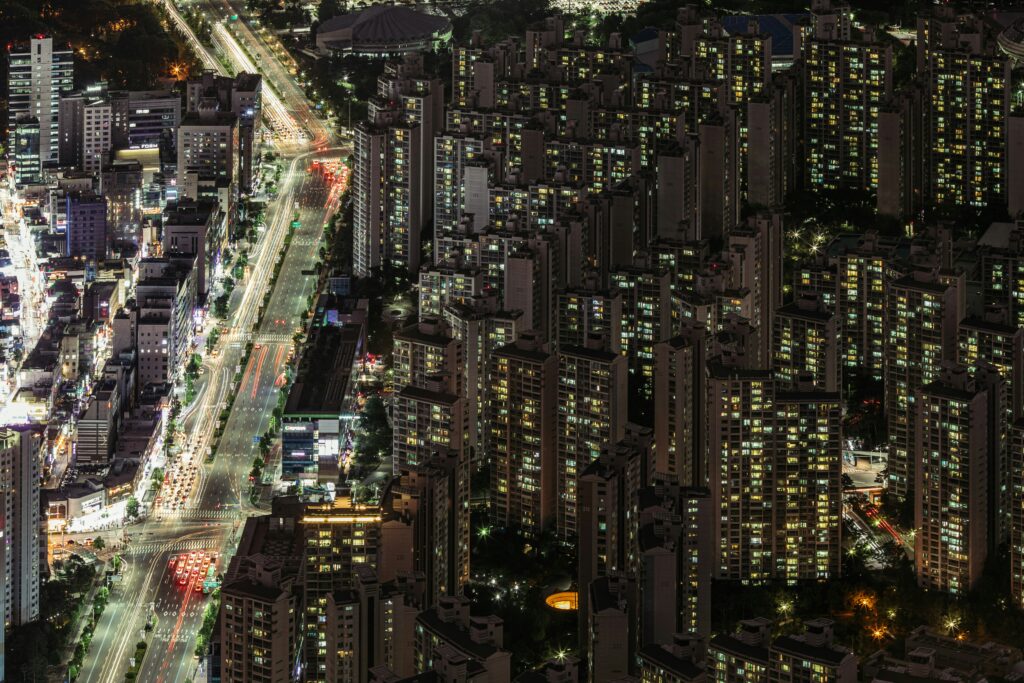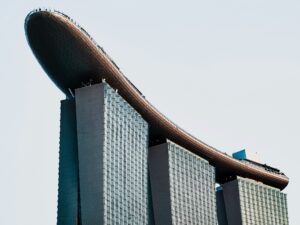In the dynamic realm of global real estate, Korea emerges as a steadfast beacon of stability and growth, underpinned by a confluence of factors that distinguish it as a prime investment destination. With a population surpassing 51 million and urbanization trends shaping its urban landscapes, Korea stands prominently on the global stage, presenting compelling opportunities for discerning investors seeking enduring returns amidst market uncertainties.

Sustainable Demand Dynamics
Korea’s real estate sector stands as a testament to resilience, underpinned by a robust domestic demand that remains impervious to shifting market tides. This demand is multifaceted, shaped by demographic shifts, evolving lifestyle preferences, and the relentless march of urbanization. As the Korean population evolves, so too do its housing needs. Young professionals seek modern, convenient living spaces in urban centers, while families prioritize homes with access to quality schools and recreational amenities. Moreover, the aging population drives demand for specialized housing options, such as senior living communities and retirement residences. The commercial sector also thrives on domestic demand, with businesses requiring office spaces, retail outlets, and logistics facilities to cater to the needs of consumers. This sustained demand across residential, commercial, and infrastructure properties forms the bedrock of Korea’s real estate market, imbuing it with resilience and enduring appeal.
Government-Led Market Catalysis
While domestic demand serves as the engine driving Korea’s real estate market, international interest adds fuel to the fire, amplifying its growth trajectory. Foreign investors are drawn to Korea’s stable economic environment, advanced infrastructure, and strategic location within East Asia. The government’s proactive approach to market development further enhances Korea’s allure, with initiatives aimed at attracting foreign investment and fostering market vibrancy. These include streamlined administrative processes, tax incentives for foreign investors, and strategic infrastructure projects designed to enhance connectivity and accessibility. Additionally, the Korean government actively promotes the nation’s real estate sector through international marketing campaigns and participation in global real estate forums and exhibitions. As a result, Korea has emerged as a preferred destination for international investors seeking diversification and long-term growth opportunities.
Government Initiatives and Market Catalysts
The Korean government’s commitment to fostering a vibrant real estate market is evident in its array of targeted initiatives and market catalysts. Central to these efforts are policies aimed at stimulating domestic investment and incentivizing foreign capital inflows. For instance, the government offers favorable financing terms and tax incentives for real estate development projects, encouraging domestic developers to invest in new ventures. Furthermore, urban redevelopment projects, such as the revitalization of aging neighborhoods and the development of smart cities, create opportunities for both domestic and foreign investors to participate in the transformation of Korea’s urban landscape. These initiatives not only spur economic growth but also enhance the overall attractiveness of Korea’s real estate market, driving demand and investment activity.
Diversified Investment Opportunities
Korea’s real estate market offers a diverse range of investment opportunities, catering to investors with varying risk appetites and investment objectives. Residential properties, ranging from luxury apartments in Seoul to affordable housing options in suburban areas, attract investors seeking stable rental income and long-term capital appreciation. Commercial properties, including office buildings, shopping malls, and logistics centers, offer opportunities for investors to capitalize on Korea’s vibrant business environment and consumer market. Additionally, infrastructure investments, such as transportation hubs, energy facilities, and smart city projects, present opportunities for investors to participate in the nation’s ongoing development and modernization efforts. With a wide array of investment options available, Korea’s real estate market provides investors with the flexibility to tailor their portfolios to suit their investment preferences and goals.
In conclusion, Korea’s real estate market stands as a beacon of stability and sustained demand amid global uncertainty. With a robust domestic demand base, proactive government initiatives, and diversified investment opportunities, Korea’s real estate sector is well-positioned for continued growth and prosperity. As the nation continues to evolve and innovate, prudent investors stand to benefit from participating in Korea’s dynamic and resilient real estate landscape. Whether seeking stable rental income, long-term capital appreciation, or diversification opportunities, Korea’s real estate market offers something for every investor, making it a compelling destination for those looking to capitalize on the nation’s economic growth and development.




buying prescription drugs in mexico online: mexican online pharmacy – medicine in mexico pharmacies
buying prescription drugs in mexico online
http://cmqpharma.com/# reputable mexican pharmacies online
п»їbest mexican online pharmacies
mexican online pharmacies prescription drugs: cmq pharma mexican pharmacy – reputable mexican pharmacies online
buying prescription drugs in mexico online
https://cmqpharma.com/# mexican pharmaceuticals online
medication from mexico pharmacy
https://canadapharmast.online/# escrow pharmacy canada
cheapest pharmacy canada: www canadianonlinepharmacy – canadian drug stores
india pharmacy indianpharmacy com india pharmacy
buying prescription drugs in mexico online: best online pharmacies in mexico – medicine in mexico pharmacies
canadian 24 hour pharmacy legit canadian pharmacy online canadian pharmacy oxycodone
canadian world pharmacy: legitimate canadian pharmacies – canadian pharmacy meds
Online medicine order: top online pharmacy india – online shopping pharmacy india
pharmacy com canada my canadian pharmacy reviews canadian king pharmacy
mexican online pharmacies prescription drugs: purple pharmacy mexico price list – buying prescription drugs in mexico online
mexico pharmacy: reputable mexican pharmacies online – purple pharmacy mexico price list
https://indiapharmast.com/# cheapest online pharmacy india
canadian pharmacy com: recommended canadian pharmacies – best canadian pharmacy online
global pharmacy canada: recommended canadian pharmacies – canada drug pharmacy
safe online pharmacies in canada: canadian drug stores – northern pharmacy canada
can you get generic clomid: cheap clomid – can i purchase clomid now
http://clomiddelivery.pro/# can you buy generic clomid pills
http://amoxildelivery.pro/# buy amoxicillin
where to buy cheap clomid: clomid medication – cost generic clomid without dr prescription
http://paxloviddelivery.pro/# paxlovid cost without insurance
doxycycline otc drug: doxycycline 200 mg tablets – doxycycline 100mg otc
http://ciprodelivery.pro/# where can i buy cipro online
http://paxloviddelivery.pro/# paxlovid covid
paxlovid buy: paxlovid price – paxlovid buy
https://clomiddelivery.pro/# can i buy cheap clomid without dr prescription
http://doxycyclinedelivery.pro/# doxycycline 100mg lowest price
paxlovid for sale: paxlovid buy – paxlovid generic
http://doxycyclinedelivery.pro/# doxycycline 50mg
doxycycline 50 mg buy uk: order doxycycline online uk – doxycycline 20 mg capsules
cipro pharmacy: buy cipro no rx – ciprofloxacin 500 mg tablet price